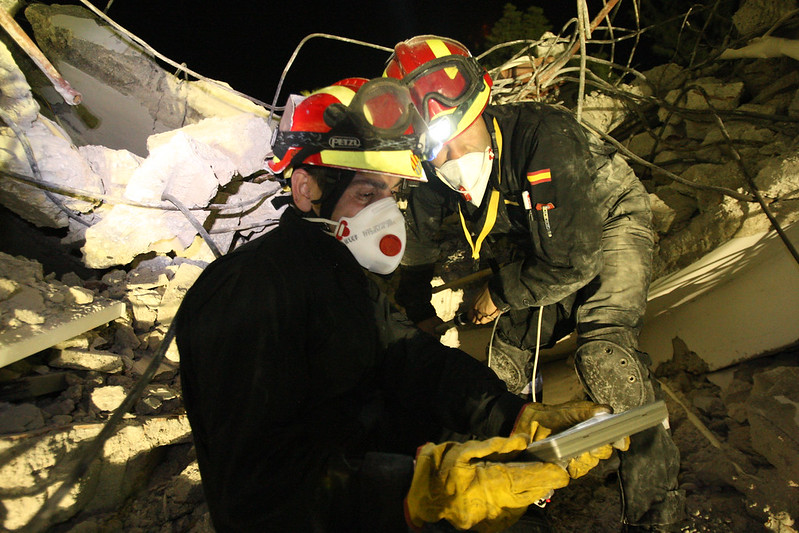Haiti, January 12, 2010. An earthquake measuring seven on the Richter scale hits the country. Many teams from different countries traveled to this country to alleviate the serious consequences.
Under the direction of the Spanish Agency for International Development Cooperation (AECID), Spain sent several intervention teams, including a UME team, which, for the first time, participated outside the country. 37 soldiers were organized into two rescue teams, medical equipment, logistics and communications.
In collaboration with firefighters from several Autonomous Communities and other nationalities (Brazilians, Chinese, Puerto Ricans, etc.), they were able to recover a total of 30 corpses from the Hotel Christopher (Port-au-Prince), headquarters of the UN Mission for Haïti (MINUSTAH); among them, the body of the Deputy Inspector of the National Police, Rosa Crespo.
UME also offered health care in a field hospital at the airport to carry out the initial classification of injured people, attend traumatic injuries or intervene surgically.
For the UME team-building, staff from both headquarters and specialists from three of its emergency intervention battalions were selected. The movement and intervention of all the elements of UME in the capital of Haïti were directed by the Headquarters Joint Operations Center (JOC) located in Torrejón.
During their stay in Haïti, UME team was visited by the Vice-President of the Government, Maria Teresa Fernandez de la Vega, who was interested in the mission’s details.
Activated on January 13, UME completed its operation in the field on February 2, after 10 days of uninterrupted activity, to mitigate as much as possible the suffering of the affected population.
The experience in this country highlighted the importance to count with a specialized rescue team to work in an international environment with the aim to integrate its efforts with the national teams in the field as fast as is required.
Almost two years later, the Emergency Military Unit, along with the Emergency and Immediate Response Unit of the Community of Madrid (ERICAM), approved the United Nations classification process that enabled it to form an Urban Search and Rescue team (USAR) as the main tool available to the United Nations in major catastrophes.
During 36 uninterrupted hours, the UN classifiers evaluated more than 150 aspects about the ability of the USAR UME team to deploy in the shortest time and operate according to standardized procedures integrated into an international operational structure.
For the United Nations, it assures that countries will send properly qualified and appropriate USAR teams to an emergency. With this initiative, Spain reinforces its commitment to the international community and joins countries such as Germany, Australia, USA or Japan.
PHOTOS

Click to see the complete album